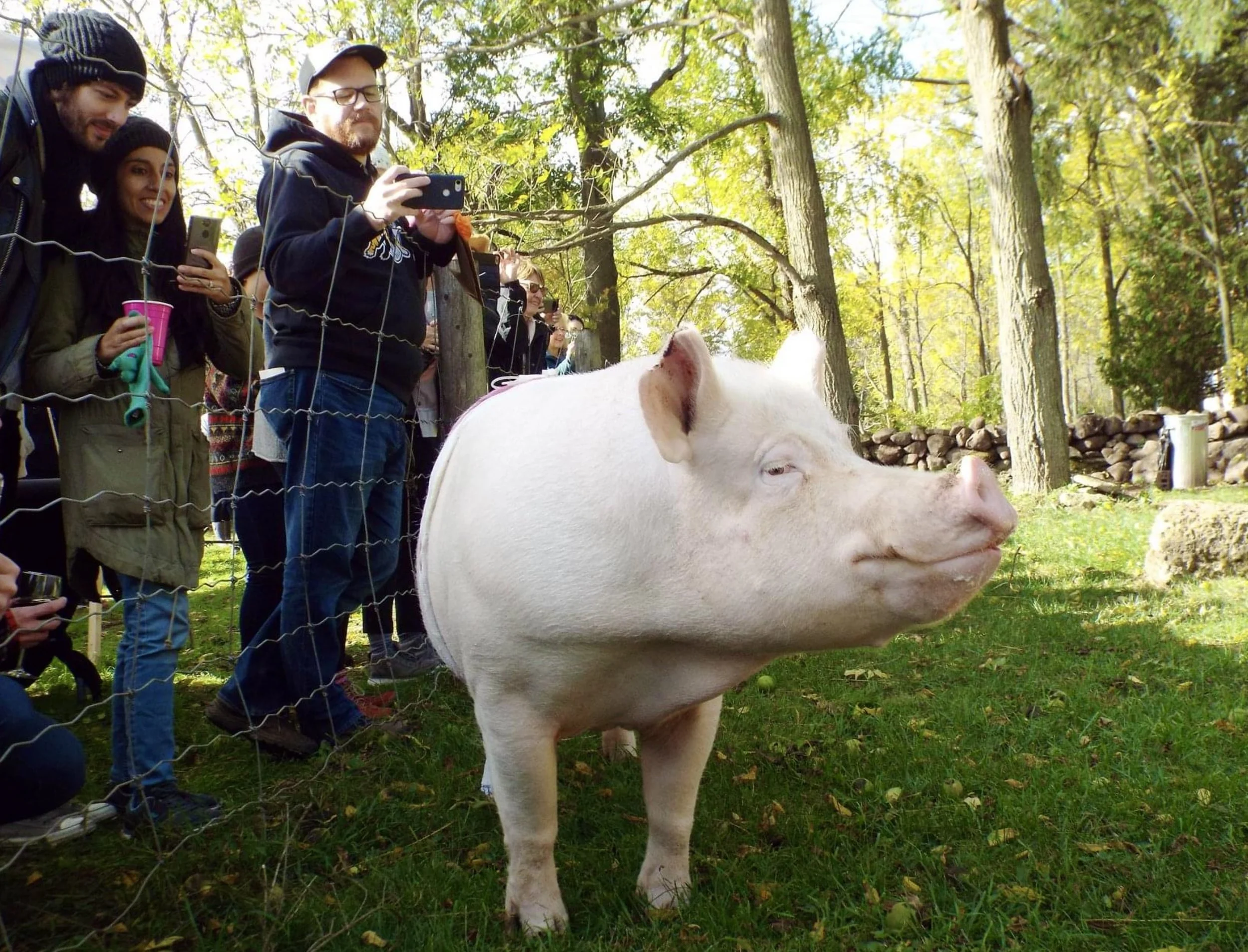By Jessica Scott-Reid
Jessica is a Canadian writer, animal advocate and plant-based food expert. Her work appears regularly in media across Canada and the US.
Esther the Wonder Pig has died. She was 11 years old. The beloved, well-known pig gained fame on social media and through a series of books, including "Esther the Wonder Pig: Changing the World One Heart at a Time,” amassing millions of fans and followers. Esther was adopted by Steve Jenkins and Derek Walter in 2012, believed at the time to be a so-called “micro-pig.” But Esther turned out to be not so micro at all, growing into a full-sized pig (weighing several hundreds of pounds), the “size of a polar bear” said Huffington Post in 2017. In fact, Esther grew larger than life.
Some of the more than 60 rescued animals who live at Esther’s farm sanctuary. Photo: Happily Ever Esther Farm Sanctuary
The famous pig would go on to prompt changes in her guardians' lives and in the lives of many others. Jenkins and Walters went on to found the Happily Ever Esther Farm Sanctuary in Ontario, where they provide a loving and permanent home to rescued animals— including cows, donkeys, sheep, rabbits, turkeys, hens and others. But it was Esther who became a symbol of compassion for farmed animals, for the changes people can make, and for the importance of animal sentience and rights. Comments on her social media often contained declarations from fans like, “I’m never eating pork again!” And customer reviews of books about Esther express much the same.
But many more of Esther’s millions of fans and followers undoubtedly continue to eat animals just like her, and her sanctuary friends. In Canada, over 20 million pigs are farmed and slaughtered each year. In the US, that number is over 120 million. Though pork consumption has seen a fairly steady decline in Canada since the 1980’s, it is forecasted to increase slightly in the next year. Those pigs consumed by Esther fans don’t have names, books or social media accounts. This makes it easier for humans to dismiss them and pay to have them harmed and killed for food. This phenomenon of loving one animal but eating others is known as Carnism.
Coined by social psychologist and author Dr. Melanie Joy, Carnism describes the invisible belief system that conditions people to eat certain animals while simultaneously forming emotional bonds with and loving others. Carnism is based on the idea that society and culture play a significant role in shaping our attitudes and behaviours toward animals. For example, in many cultures, dogs and cats are considered companions and are loved as pets, while other animals, like cows, pigs, and chickens, are raised for food. This dichotomy is often deeply ingrained and rarely questioned.
Esther and some of her admirers at an open house day at the sanctuary. Photo: Happily Ever Esther Farm Sanctuary
Esther though, offered a rare example of selective compassion across species lines, and highlighted what is known as “the meat paradox.” This refers to the psychological conflict between enjoying and consuming meat while simultaneously being aware of the ethical, environmental, and health implications of modern meat production. It explores the dissonance between personal preferences for meat and the cognitive disapproval of its associated consequences. Esther presented a perfect example of this conflict, as an individualized character, someone fans the world over felt they knew and loved, but who had to somehow be different from the billions of animals crammed into barns and transport trucks.
Mother pigs confined to gestation crates on a factory farm. Photo: Jo-Anne McArthur, We Animals Media
At the psychological level, humans tend to feel more compassion for individual animals, particularly those with names or distinct identities, as opposed to large groups of animals farmed for food. When we can identify an animal as an individual rather than just an unnamed one of many, humans tend to build a more personal connection, allowing us to better empathize more readily than with abstract groups. In the case of Esther, like with our own pets, we are more likely to feel compassion for the animals we are familiar with, whether that’s in real-life relationships or even virtually.
But the truth is, Esther was not different from those pigs in the trucks that people see on the highways. Esther was not different from the animals slaughtered and packaged up for sale in the meat aisle. Those animals were just as sentient, just as aware and just as innocent as she was. The only real difference is that Esther got to live her full life span, and in comfort, and she got to be loved. Pigs are typically slaughtered at 5-6 months.
Some of Esther’s fans who travel from countries all over the world to visit the farm sanctuary. Photo: Happily Ever Esther Farm Sanctuary
Esther’s legacy will certainly be all the fans whose lives she transformed, and also those who have yet to make changes as a result of hearing her story. Esther will continue to encourage people to connect with farmed animals and seek a greater understanding of their social and emotional lives. Because though the star has passed, the show must go on, for the billions of Esthers who remain.





